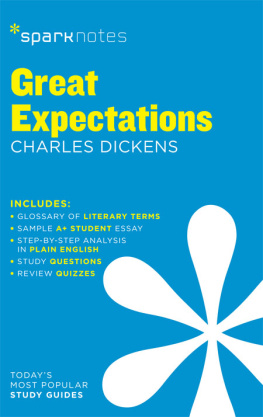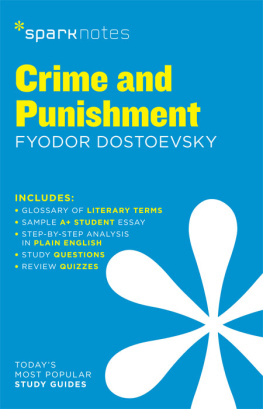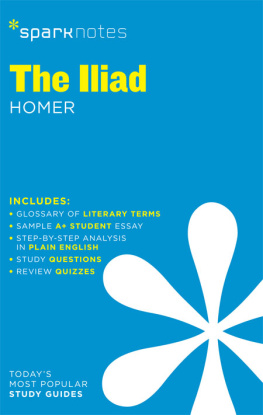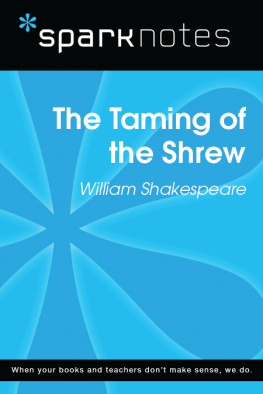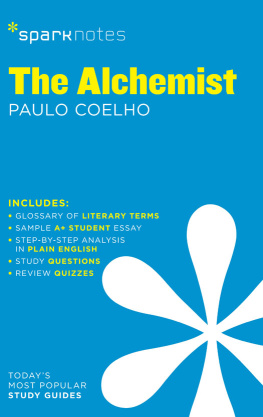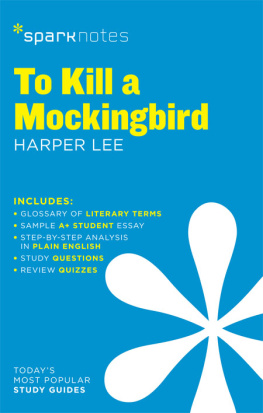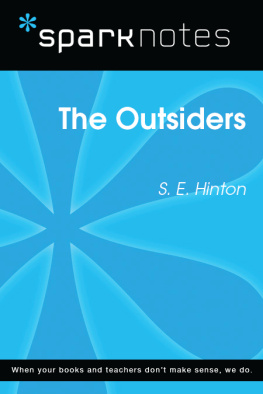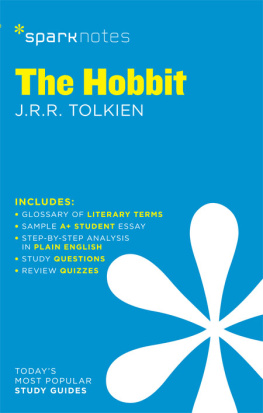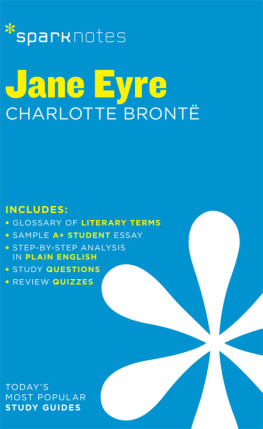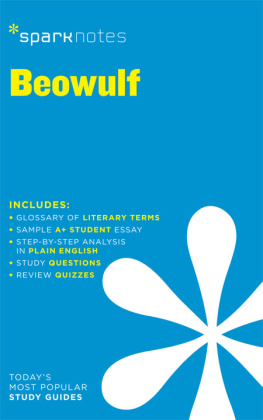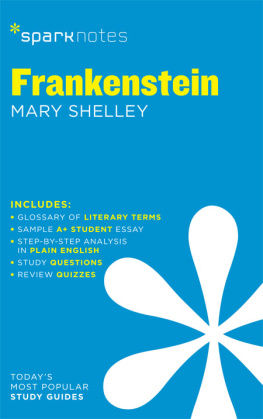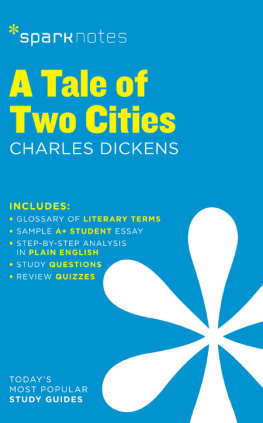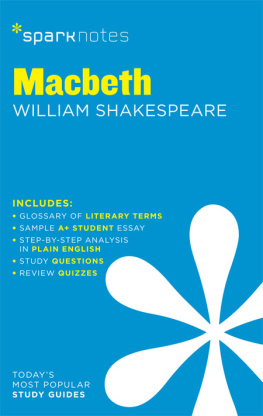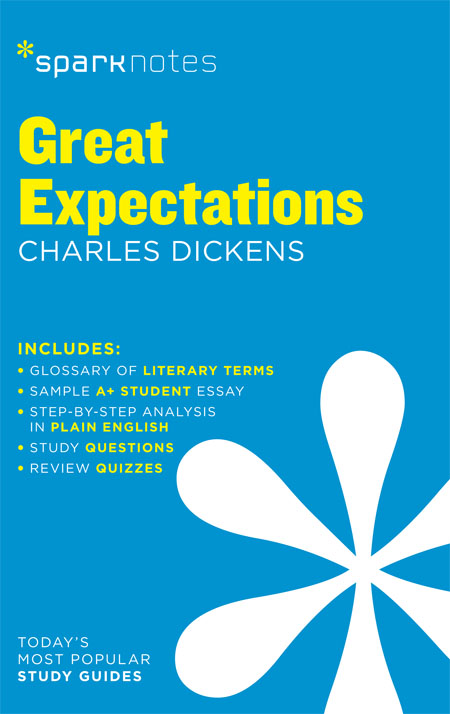Great Expectations
Charles Dickens
2003, 2007 by Spark Publishing
This Spark Publishing edition 2014 by SparkNotes LLC, an Affiliate of Barnes & Noble
All rights reserved. No part of this publication may be reproduced, stored in a retrieval system, or transmitted in any form or by any means (including electronic, mechanical, photocopying, recording, or otherwise) without prior written permission from the publisher.
Sparknotes is a registered trademark of SparkNotes LLC
Spark Publishing
A Division of Barnes & Noble
120 Fifth Avenue
New York, NY 10011
www.sparknotes.com /
ISBN-13: 978-1-4114-7162-7
Please submit changes or report errors to www.sparknotes.com/errors.
10 9 8 7 6 5 4 3 2 1
Context
C harles Dickens was born on February , 1812 , and spent the first nine years of his life living in the coastal regions of Kent, a county in southeast England. Dickenss father, John, was a kind and likable man, but he was incompetent with money and piled up tremendous debts throughout his life. When Dickens was nine, his family moved to London. When he was twelve, his father was arrested and taken to debtors prison. Dickenss mother moved his seven brothers and sisters into prison with their father, but she arranged for the young Charles to live alone outside the prison and work with other children pasting labels on bottles in a blacking warehouse (blacking was a type of manufactured soot used to make a black pigment for products such as matches or fertilizer). Dickens found the three months he spent apart from his family highly traumatic. Not only was the job itself miserable, but he considered himself too good for it, earning the contempt of the other children. After his father was released from prison, Dickens returned to school. He eventually became a law clerk, then a court reporter, and finally a novelist. His first novel, The Pickwick Papers, became a huge popular success when Dickens was only twenty-five. He published extensively and was considered a literary celebrity until his death in 1870 .
Many of the events from Dickenss early life are mirrored in Great Expectations, which, apart from David Copperfield, is his most autobiographical novel. Pip, the novels protagonist, lives in the marsh country, works at a job he hates, considers himself too good for his surroundings, and experiences material success in London at a very early age, exactly as Dickens himself did. In addition, one of the novels most appealing characters, Wemmick, is a law clerk, and the law, justice, and the courts are all important components of the story.
Great Expectations is set in early Victorian England, a time when great social changes were sweeping the nation. The Industrial Revolution of the late eighteenth and early nineteenth centuries had transformed the social landscape, enabling capitalists and manufacturers to amass huge fortunes. Although social class was no longer entirely dependent on the circumstances of ones birth, the divisions between rich and poor remained nearly as wide as ever. London, a teeming mass of humanity, lit by gas lamps at night and darkened by black clouds from smokestacks during the day, formed a sharp contrast with the nations sparsely populated rural areas. More and more people moved from the country to the city in search of greater economic opportunity. Throughout England, the manners of the upper class were very strict and conservative: gentlemen and ladies were expected to have thorough classical educations and to behave appropriately in innumerable social situations.
These conditions defined Dickenss time, and they make themselves felt in almost every facet of Great Expectations. Pips sudden rise from country laborer to city gentleman forces him to move from one social extreme to another while dealing with the strict rules and expectations that governed Victorian England. Ironically, this novel about the desire for wealth and social advancement was written partially out of economic necessity. Dickenss magazine, All the Year Round, had become extremely popular based on the success of works it had published in serial, such as his own A Tale of Two Cities and Wilkie Collinss The Woman in White. But it had experienced a decline in popularity after publishing a dull serial by Charles Lever called A Days Ride. Dickens conceived of Great Expectations as a means of restoring his publications fortunes. The book is still immensely popular a century and a half later.
In form, Great Expectations fits a pattern popular in nineteenth-century European fiction: the bildungsroman, or novel depicting growth and personal development, generally a transition from boyhood to manhood such as that experienced by Pip. The genre was popularized by Goethe with his book Wilhelm Meister ( 1794 1796 ) and became prevalent in England with such books as Daniel Defoes Robinson Crusoe, Charlotte Bronts Jane Eyre, and Dickenss own David Copperfield. Each of these works, like Great Expectations, depicts a process of maturation and self-discovery through experience as a protagonist moves from childhood to adulthood.
Plot Overview
P ip, a young orphan living with his sister and her husband in the marshes of Kent, sits in a cemetery one evening looking at his parents tombstones. Suddenly, an escaped convict springs up from behind a tombstone, grabs Pip, and orders him to bring him food and a file for his leg irons. Pip obeys, but the fearsome convict is soon captured anyway. The convict protects Pip by claiming to have stolen the items himself.
One day Pip is taken by his Uncle Pumblechook to play at Satis House, the home of the wealthy dowager Miss Havisham, who is extremely eccentric: she wears an old wedding dress everywhere she goes and keeps all the clocks in her house stopped at the same time. During his visit, he meets a beautiful young girl named Estella, who treats him coldly and contemptuously. Nevertheless, he falls in love with her and dreams of becoming a wealthy gentleman so that he might be worthy of her. He even hopes that Miss Havisham intends to make him a gentleman and marry him to Estella, but his hopes are dashed when, after months of regular visits to Satis House, Miss Havisham decides to help him become a common laborer in his familys business.
With Miss Havishams guidance, Pip is apprenticed to his brother-in-law, Joe, who is the village blacksmith. Pip works in the forge unhappily, struggling to better his education with the help of the plain, kind Biddy and encountering Joes malicious day laborer, Orlick. One night, after an altercation with Orlick, Pips sister, known as Mrs. Joe, is viciously attacked and becomes a mute invalid. From her signals, Pip suspects that Orlick was responsible for the attack.
One day a lawyer named Jaggers appears with strange news: a secret benefactor has given Pip a large fortune, and Pip must come to London immediately to begin his education as a gentleman. Pip happily assumes that his previous hopes have come truethat Miss Havisham is his secret benefactor and that the old woman intends for him to marry Estella.
In London, Pip befriends a young gentleman named Herbert Pocket and Jaggerss law clerk, Wemmick. He expresses disdain for his former friends and loved ones, especially Joe, but he continues to pine after Estella. He furthers his education by studying with the tutor Matthew Pocket, Herberts father. Herbert himself helps Pip learn how to act like a gentleman. When Pip turns twenty-one and begins to receive an income from his fortune, he will secretly help Herbert buy his way into the business he has chosen for himself. But for now, Herbert and Pip lead a fairly undisciplined life in London, enjoying themselves and running up debts. Orlick reappears in Pips life, employed as Miss Havishams porter, but is promptly fired by Jaggers after Pip reveals Orlicks unsavory past. Mrs. Joe dies, and Pip goes home for the funeral, feeling tremendous grief and remorse. Several years go by, until one night a familiar figure barges into Pips roomthe convict, Magwitch, who stuns Pip by announcing that he, not Miss Havisham, is the source of Pips fortune. He tells Pip that he was so moved by Pips boyhood kindness that he dedicated his life to making Pip a gentleman, and he made a fortune in Australia for that very purpose.

